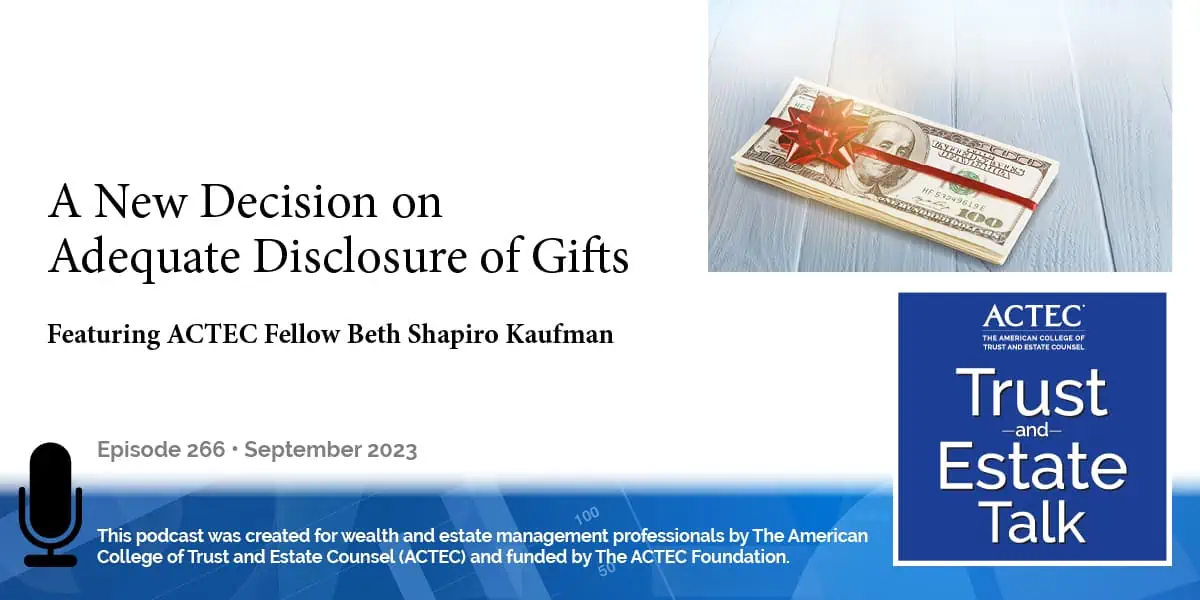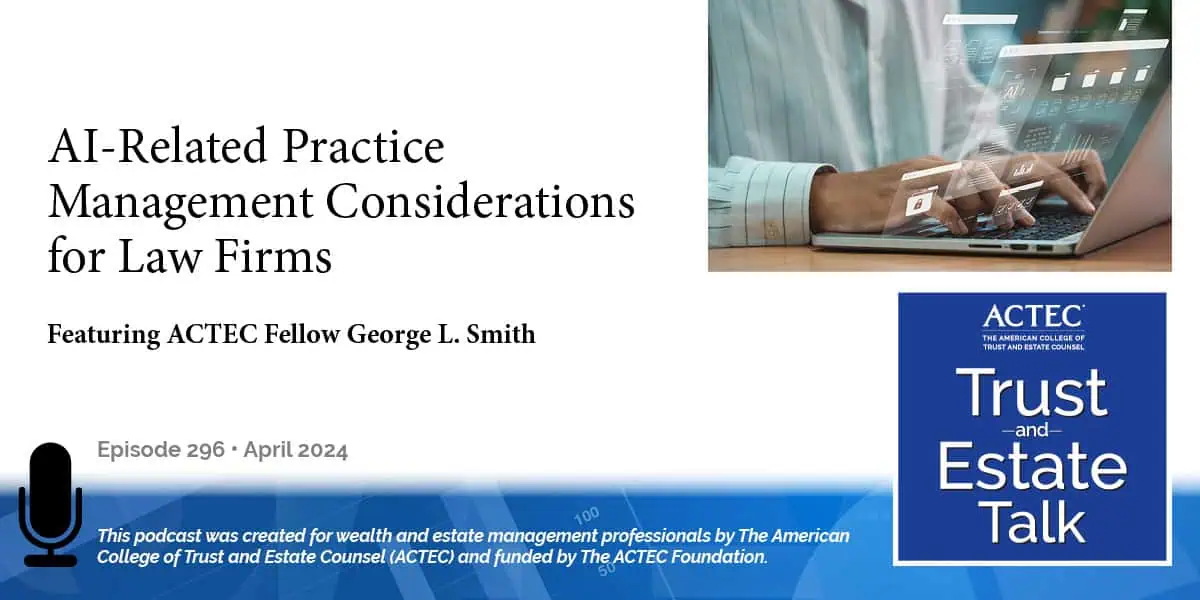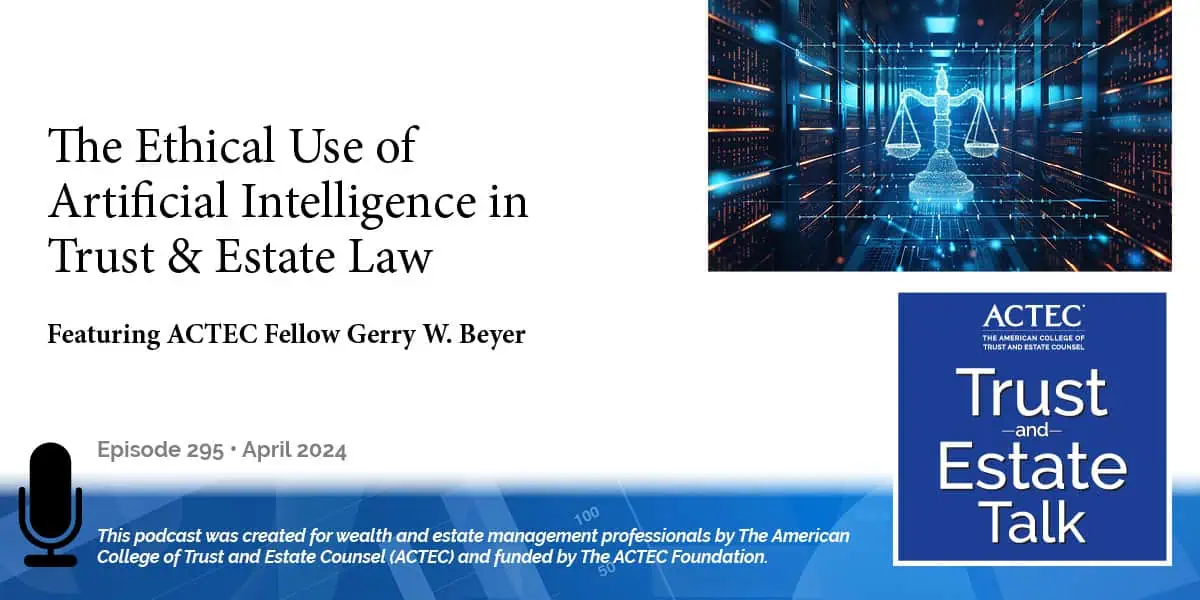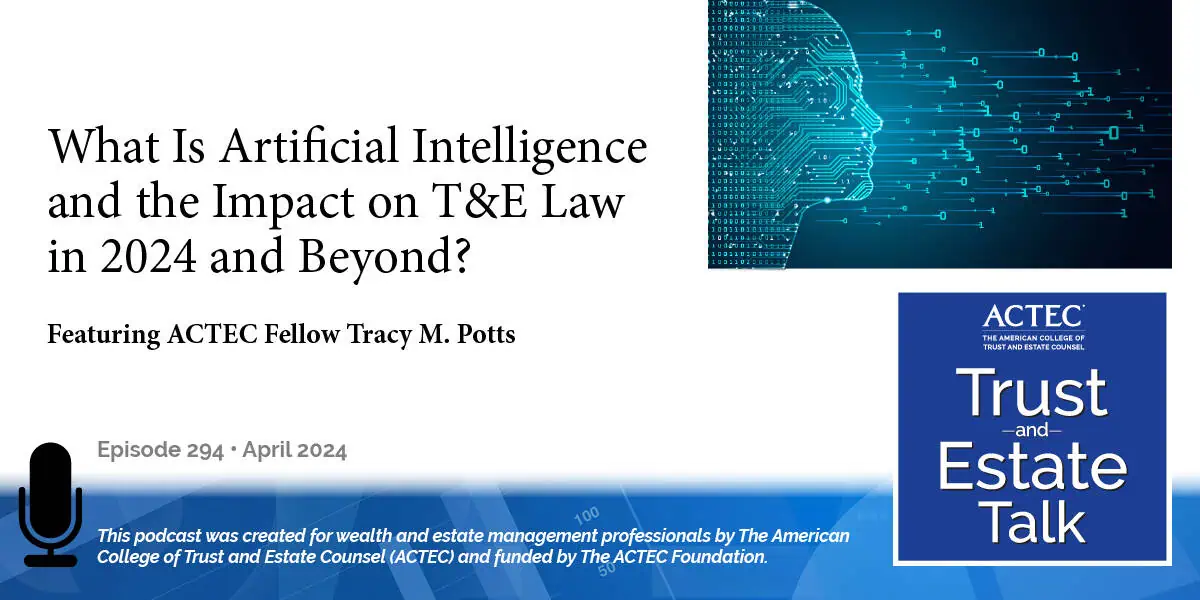A New Decision on Adequate Disclosure of Gifts

“A New Tax Court Decision on Adequate Disclosure of Gifts,” that’s the subject of today’s ACTEC Trust and Estate Talk.
Transcript/Show Notes
This is Travis Hayes, ACTEC Fellow from Naples, Florida. In May 2023, the Tax Court released an opinion in Schlapfer v. Commissioner, a case assessing if a 2006 gift tax return was adequately filed and if there were any tax implications. ACTEC Fellow Beth Kaufman of Washington, D.C. joins us today to discuss the significance of the case, the Tax Court’s decision, and the takeaways for tax professionals. Welcome, Beth.
Background on Adequate Disclosure of Gifts
Beth Shapiro Kaufman: Thanks, Travis. So, let’s start by putting this case into context. It deals with a law that was enacted in 1997. Code Section 6501(c)(9) says that the statute of limitations won’t run on a gift unless that gift is disclosed in a return or a statement attached to the return in a manner adequate to apprise the secretary of the nature of such item. So, for those of you who are curious, before that 1997 law, the rule was that if you filed a gift tax return for a particular year, the statute of limitations would run for that year on all gifts whether they were disclosed or not. But back to the present.
If we break down that statutory language, we really see a couple of requirements there.
- One is that we have to have a disclosure in a return or in a statement attached to a return.
- And the other is that the statement has to be adequate to apprise the IRS of the nature of the item.
After that legislation was enacted, the IRS proposed and finalized regulations that have details on what constitutes “adequate disclosure” as we call it. The regulations say that a gift will be adequately disclosed if you disclose a description of the transferred property and any consideration received by the transferor; the identity of and relationship between the transferor and each transferee; if the transfer is in trust, you have to disclose the trust’s Tax ID No. and a brief description of the terms of the trust, or you can attach the entire trust; you have to have a detailed description of the method used to determine fair market value or you can attach a qualified appraisal; and you need to include a statement describing any position that’s contrary to any proposed, temporary or final IRS regulation or revenue rulings that are published at the time of the transfer.
So, up until now, the IRS has taken a very strict view on what constitutes adequate disclosure. For example, there was a 2015 field advice that concerned a gift of an interest in a partnership. And the IRS took the position that because, on the gift tax return, the EIN was missing one digit, that gift was not adequately disclosed.
Tax Court in Schlapfer v. Comm’r of Internal Revenue Case
So, now, along comes the Tax Court in Schlapfer. Let me give you a brief flavor of the facts in this case. The taxpayer was born in Switzerland, and he worked as a banker in the US and in Switzerland at various times. He had a green card for a while. And then, in 2008, he became a US citizen. So, back in 2006, Mr. Schlapfer bought a Swiss life insurance policy and he funded it with stock in a corporation that he owned and with cash. that’s something you can do in Switzerland.
He assigned ownership of the policy to his mother, his aunt, and his uncle, except that the company issued the policy with him as a policyholder. And it took him until May of 2007 to straighten all of that out.
Fast forward to 2013. And, in 2013, Mr. Schlapfer participated in the Offshore Voluntary Disclosure Program (OVDP) because he had not filed income tax returns for the years 2004 through 2009. So, when you do the OVDP Program, you have to submit a big packet of information. And, included in that packet, he had his 2004 through 2009 income tax returns, a gift tax return from 2006 in which he reported a gift of the stock of the company to his mother, his aunt, and his uncle. And he also included a Form 5471 Information Return for a foreign corporation, that corporation that he used to fund the life insurance policy. And that form required him to submit information on who owned the company, how many shareholders there were, how many outstanding shares, a copy of the company’s income statement, balance sheet, its earnings, and profits, so a fair amount of information about that company. And, on his 2006 gift tax return, he took the position that he was not domiciled in the United States in 2006 because he hadn’t formed in the intention to remain in the United States and therefore, he was not subject to US gift tax.
So, in 2014, the IRS looking through his OVDP package, sent him some questions having to do with his gift tax return– in 2014, the IRS issued a bunch of IDRs (Information Document Request) to Schlapfer asking him questions about his 2006 gift tax return. They asked him to document the gift of the company to his mother and to substantiate the claim that he wasn’t domiciled in the United States in 2006.
He promptly responded and sent them everything that they asked for. And then, in 2016, the IRS opened an examination of this 2006 gift tax return. They contacted the taxpayer. he agreed to extend the statute of limitations for a year. But several months later the IRS wrapped up the examination of the 2006 return because they said they had concluded that he didn’t make any gifts in 2006. Because the policy owners were wrong, the gift wasn’t completed until 2007. So, then in 2019, the IRS came back. They issued a notice of deficiency for 2007. They said that Mr. Schlapfer owed over $4 million in gift tax and that the gift had occurred in 2007, not in 2006 because he had retained dominion and control over that property, that it was a gift of an insurance policy and not a gift of stock, and that he was domiciled in the United States in 2007.
So, when this gets to the Tax Court, we’ve got cross-motions for summary of judgment, where the issue is “was there adequate disclosure of this gift, which would mean the IRS couldn’t maintain a deficiency for 2007, or were there so many defects here that the gift wasn’t adequately disclosed and the IRS could go ahead and assess gift tax?”
So, remember that Code Section 6501(c)(9) says that the commissioner can assess tax on a gift at any time unless it’s been adequately disclosed in a manner adequate to apprise the secretary of the nature of the item. So, if this had been adequately disclosed, then 2019 would have been too late for the commissioner to assess gift tax. But the Tax Court found that Schlapfer’s disclosure with his 2006 gift tax return was sufficient to commence the three-year statute of limitations running on that return and that that would time bar an assessment of tax whether that gift was made in 2006 or 2007. The Court said, “a disclosure’s adequate if it’s sufficiently detailed to alert the commissioner and his agents as to the nature of the transaction so that the decision as to whether to select the return for audit may be a reasonably informed one.” Probably didn’t hurt that they had actually audited the 2006 return as well.
So, the Court found that it could consider all of the materials submitted with the 2006 gift tax return, which included balance sheets and other information on the company, even though those were filed as part of the OVDP Program with the income tax returns and the information reporting. The Court looked at all of that information and found that there was adequate disclosure. The next thing the Court considered was whether the standard here was for strict compliance or substantial compliance. And they found that only substantial compliance was required. The Court reasoned that the essence of this rule was to provide the Commissioner with a viable way of identifying gift tax returns that should be examined with a minimum expenditure of resources.
Then the Court looked at whether the taxpayer substantially complied. As you can see, his compliance was less than ideal, right? The description of the property transferred, he said he transferred a company interest. He’d actually transferred life insurance. The date of the gift, was it 2006, or was it 2007? Who was the recipient of the gift? In one place, he said it was just his mother. In another place, he said it was the mother, aunt, and uncle. And the description of the method to value the gift was embedded in some of the other information there, but still not the kind of strict compliance that the IRS likes to see. But despite all of that, the Court found that there was substantial compliance and adequate disclosure and concluded that the deficiency for 2007 was time-barred.
Takeaways from the IRS Decision in Schlapfer v. Commissioner
So, what can we learn from this? If we’re in a planning situation, I don’t want you to learn anything from this. Because if you’re in a planning situation, you should try to comply strictly with the requirements and the regulations and comply with them in full.
But if you find yourself in a dispute with the IRS and you want to argue that there’s been adequate disclosure of the gift and therefore the statute of limitations has run and it’s too late to assess gift tax, we’ve now got a really strong opinion in Tax Court to back us up on the position that strict compliance with the adequate disclosure regulations is not necessary. The disclosure just has to be adequate to provide the IRS with a way to determine whether the gift tax return should be examined.
So, this is a huge taxpayer victory. We don’t know yet whether the IRS is going to appeal. I would guess they probably will. But in the meantime, we’ve got a lot more ammunition for adequate disclosure than we used to.
Travis Hayes: Thank you, Beth, for updating us on the taxpayer-friendly decision in Schlapfer v. Commissioner and takeaways for tax professionals.
You may also be interest in:
Latest ACTEC Trust and Estate Talk Podcasts

AI-Related Practice Management Considerations for Law Firms
A discussion for law firms about how to incorporate AI in their practice management, including staff considerations, the “billable hour,” and more.

The Ethical Use of Artificial Intelligence in Trust & Estate Law
A law professor offers insights into the risks, rewards, duties and ethical considerations of lawyers using AI in their T&E practices.

What Is Artificial Intelligence and the Impact on T&E Law in 2024 and Beyond?
A primer on the types and uses of AI, then a deeper dive into the impact on trust and estate law from types to applications to ethical considerations.

